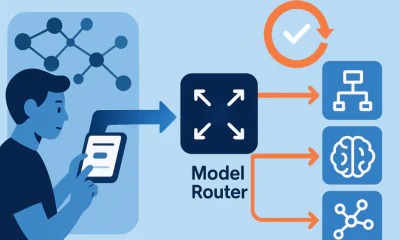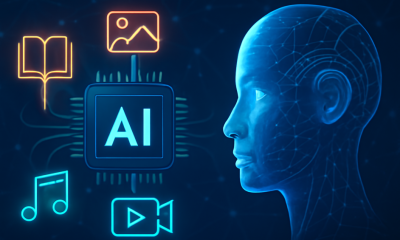Artificial Intelligence
Exploring Gemini 1.5: How Google’s Latest Multimodal AI Model Elevates the AI Landscape Beyond Its Predecessor

In the rapidly evolving landscape of artificial intelligence, Google continues to lead with its pioneering developments in multimodal AI technologies. Shortly after the debut of Gemini 1.0, their cutting-edge multimodal large language model, Google has now unveiled Gemini 1.5. This iteration not only enhances the capacity established by Gemini 1.0 but also brings about significant improvements in Google’s methodology for processing and integrating multimodal data. This article provides an exploration of Gemini 1.5, shedding light on its innovative approach and distinctive features.
Gemini 1.0: Laying the Foundation
Launched by Google DeepMind and Google Research on December 6, 2023, Gemini 1.0 introduced a new breed of multimodal AI models capable of understanding and generating content in various formats, such as text, audio, images, and video. This marked a significant step in AI, broadening the scope for managing diverse information types.
Gemini’s standout feature is its capacity to seamlessly blend multiple data types. Unlike conventional AI models that may specialize in a single data format, Gemini integrates text, visuals, and audio. This integration enables it to perform tasks like analyzing handwritten notes or deciphering complex diagrams, thereby solving a broad spectrum of complex challenges.
The Gemini family offers models for various applications: the Ultra model for complex tasks, the Pro model for speed and scalability on major platforms like Google Bard, and the Nano models (Nano-1 and Nano-2) with 1.8 billion and 3.25 billion parameters, respectively, designed for integration into devices like the Google Pixel 8 Pro smartphone.
The Leap to Gemini 1.5
Google’s latest release, Gemini 1.5, enhances the functionality and operational efficiency of its predecessor, Gemini 1.0. This version adopts a novel Mixture-of-Experts (MoE) architecture, a departure from the unified, large model approach seen in its predecessor. This architecture incorporates a collection of smaller, specialized transformer models, each adept at managing specific segments of data or distinct tasks. This setup allows Gemini 1.5 to dynamically engage the most appropriate expert based on the incoming data, streamlining the model’s ability to learn and process information.
This innovative approach significantly elevates the model’s training and deployment efficiency by activating only the necessary experts for tasks. Consequently, Gemini 1.5 is capable of rapidly mastering complex tasks and delivering high-quality results more efficiently than conventional models. Such advancements allow Google’s research teams to accelerate the development and enhancement of the Gemini model, extending the possibilities within the AI domain.
Expanding Capabilities
A notable advancement in Gemini 1.5 is its expanded information processing capability. The model’s context window, which is the amount of user data it can analyses to generate responses, now extends to up to 1 million tokens — a substantial increase from the 32,000 tokens of Gemini 1.0. This enhancement means Gemini 1.5 Pro can simultaneously process extensive amounts of data, such as an hour of video content, eleven hours of audio, or large codebases and textual documents. It has also been successfully tested with up to 10 million tokens, showcasing its exceptional ability to comprehend and interpret enormous datasets.
A Glimpse into Gemini 1.5’s Capabilities
Gemini 1.5’s architectural improvements and the expanded context window empower it to perform sophisticated analysis over large information sets. Whether it’s delving into the intricate details of the Apollo 11 mission transcripts or interpreting a silent film, Gemini 1.5 demonstrates unparalleled problem-solving abilities, especially with lengthy code blocks.
Developed on Google’s advanced TPUv4 accelerators, Gemini 1.5 Pro has been trained on a diverse dataset, encompassing various domains and including multimodal and multilingual content. This broad training base, combined with fine-tuning based on human preference data, ensures that Gemini 1.5 Pro’s outputs resonate well with human perceptions.
Through rigorous benchmark testing against a plethora of tasks, Gemini 1.5 Pro not only outperforms its predecessor in a vast majority of evaluations but also stands toe-to-toe with the larger Gemini 1.0 Ultra model. Gemini 1.5 Pro exhibits strong “in-context learning” abilities, effectively gaining new knowledge from detailed prompts without the need for further adjustments. This was particularly evident in its performance on the Machine Translation from One Book (MTOB) benchmark, where it translated from English to Kalamang—a language spoken by a small number of people—with proficiency comparable to that of human learning, underscoring its adaptability and learning efficiency.
Limited Preview Access
Gemini 1.5 Pro is now available in a limited preview for developers and enterprise customers through AI Studio and Vertex AI, with plans for a wider release and customizable options on the horizon. This preview phase offers a unique opportunity to explore its expanded context window, with improvements in processing speed anticipated. Developers and enterprise customers interested in Gemini 1.5 Pro can register through AI Studio or contact their Vertex AI account teams for further information.
The Bottom Line
Gemini 1.5 represents a notable step forward in the development of multimodal AI. Building on the foundation laid by Gemini 1.0, this new version brings improved methods for processing and integrating different types of data. Its introduction of a novel architectural approach and expanded data processing capabilities highlight Google’s ongoing effort to enhance AI technology. With its potential for more efficient task handling and advanced learning, Gemini 1.5 showcases the continuous evolution of AI. Currently available for a select group of developers and enterprise customers, it signals exciting possibilities for the future of AI, with wider availability and further advancements on the horizon.












